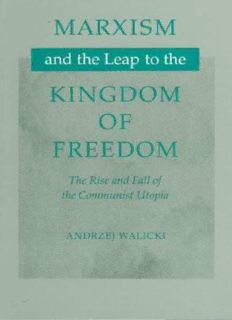
Marxism and the Leap to the Kingdom of Freedom: The Rise and Fall of the Communist Utopia PDF
Preview Marxism and the Leap to the Kingdom of Freedom: The Rise and Fall of the Communist Utopia
Andrzej Walicki Marxism and the Leap to the Kingdom of Freedom The Rise and Fall of the Communist Utopia STANFORD UNIVERSITY PRESS STANFORD, CALIFORNIA 1995 -iii- Stanford University Press Stanford, California © 1995 by the Board of Trustees of the Leland Stanford Junior University Printed in the United States of America CIP data appear at the end of the book Stanford University Press publications are distributed exclusively by Stanford University Press within the United States, Canada, Mexico, and Central America; they are distributed exclusively by Cambridge University Press throughout the rest of the world. Original printing 1995 Last figure below indicates year of this printing: 05 04 03 02 01 00 99 98 97 96 -iv- To Marzena -v- [This page intentionally left blank.] -vi- Acknowledgments This book, which was finished in September 1992, is mostly a result of several years of my research and teaching at the University of Notre Dame. Several chapters are directly related to my graduate courses on "The Marxist Conception of Freedom," "Soviet Marxism," and "The Marxist Theory of Communism." Work on this book was also supported by the following institutions: the Social Philosophy and Policy Center at the University of Bowling Green (Ohio), where I spent the spring semester of 1989; the J. S. Guggenheim Memorial Foundation, whose fellowship in 1990-91 enabled me to enjoy several months of productive work and lively scholarly contacts in Russia; and finally, the Humanities Research Centre of the Australian National University (Canberra), which offered me three months' visiting fellowship from May through August 1992. To all these institutions, grateful acknowledgment is made. Among friends and colleagues to whom I feel indebted for helping me to persist in coping with the vast and often thankless subject of this book, I should mention the following: Dr. Zbigniew Pelczynski, from Pembroke College, Oxford, who in 1980 became interested in my views on Marxism and asked me to write an essay on "The Marxian Conception of Freedom" for the book Conceptions of Liberty in Political Philosophy (ed. Z. Pelczynski and J. Gray, London, 1984); Professor Leszek Kolakowski, an old friend who read this essay in 1981 and, despite his declining interest in the subject, encouraged me -vii- to continue my work in this field; Sir Isaiah Berlin, who read my article "Marx and Freedom," commented on it in a long letter to me, and recommended it for publication in the New York Review of Books; and finally, Professor T. H. Rigby, from the Australian National University, who read the last two chapters, commented on them, and above all, supported my hope that a book by an intellectual historian might prove interesting and relevant to political scientists. I am grateful also to Mrs. Elisabeth Short, the research assistant in the History of Ideas Unit in the Australian National University, for reading chapters 4, 5, and 6 and greatly improving my style. Of course, she is not responsible for the final linguistic shape of this work. -viii- Contents A Note to the Reader xi Introduction I 1. Marx as Philosopher of Freedom 1.1. Preliminary Remarks II 1.2. Civil and Political Liberty: A Confrontation with 21 Liberalism 1.3. The Story of Self-Enriching Alienation: A General 38 Outline 1.4. The Paris Manuscripts: Human Essence Lost and 44 Regained 1.5. The German Ideology: The Division of Labor and the 53 Myth of Human Identity 1.6. Grundrisse: The World Market as Alienated 62 Universalism 1.7. Self-Enriching Alienation in Capital and the 71 Abandonment of Youthful Optimism 1.8. The Vision of the Future: The Transition Period and 89 the Final Ideal 1.9. Capitalism and Freedom in the Post-Marxian 99 Sociological Tradition: The Case of Marx Versus Simmel 2. Engels and "Scientific Socialism" 2.1. The Problem of "Engelsian Marxism" III 2.2. From Pantheism to Communism 124 2.3. Political Economy and Communist Utopia 139 2.4. "Historical Necessity" in the World of Nations 152 -ix- 2.5. Freedom as "Necessity Understood" 167 2.6. From Freedom Lost to Freedom . . . Regained? 179 2.7. The Dual Legacy 196 3. Variants of "Necessitarian" Marxism 3.1. Karl Kautsky: From the "Historical Necessity" of 208 Communism to the "Historical Necessity" of Democracy 3.2. Georgii Plekhanov: "Historical Necessity" as Utopian 228 Ideal 3.3. Rosa Luxemburg, or Revolutionary Amor Fati 246 4. Leninism: From "Scientific Socialism" to Totalitarian Communism 4.1. Lenin's Tragedy of Will and Fate 269 4.2. Lenin's Critique of "Bourgeois Freedom" and the 279 Russian Populist Heritage 4.3. The Workers' Movement and the Party 291 4.4. The Destruction of "Nomocracy" and the 303 Legitimization of Violence 4.5. The Partisan Principle in Literature and Philosophy 309 4.6. The Dictatorship of the Proletariat and the State 322 4.7. The Dictatorship of the Proletariat and the Law 346 4.8. The Dictatorship of the Proletariat and the Economic 359 Utopia 5. From Totalitarian Communism to Communist Totalitarianism 5.1. Leninism and Stalinism: The Controversy over the 398 Continuity Thesis 5.2. Stalinist Marxism as a Total View of the World 426 5.3. "Dual Consciousness" and Totalitarian "Ideocracy" 454 6. The Dismantling of Stalinism: Detotalitarization and Decommunization 6.1. Preliminary Remarks 495 6.2. Marxist Freedom and Communist Totalitarianism 497 6.3. The Phases and Factors of Detotalitarization and 508 Decommunization 6.4. Gorbachev's Perestroika and the Final Rejection of 536 Communist Freedom Notes 559 Works Cited 619 Index of Names 637 -x-
Description: